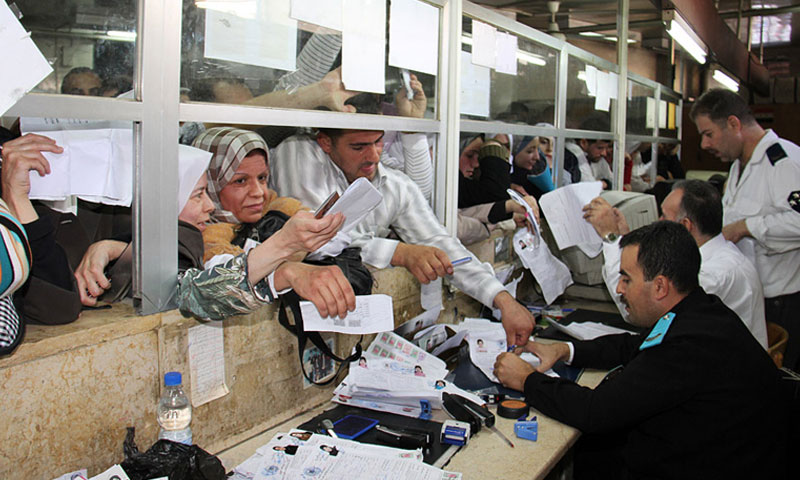



Enab Baladi – Daraa
The Syrian regime restricted the courts and state departments to its geographical control. This prevented citizens from registering their marriage in Sharia courts, and their children in civil records, and left many cases without identification papers, during the years of opposition factions’ control over Daraa governorate.
After the settlement that ended with the regime’s control of Daraa, in July 2018, many problems related to personal status and registration of marriage and children, came to the fore in the civil registry departments in the governorate.
The civil status circles in the Daraa governorate witnessed a high turnout by the people who went for many years without settling their status.
Polygamy, without formal restrictions in the Sharia court, is one of these issues.
Umm Ahmad, a woman from Daraa, told Enab Baladi, that she had married a man and they had three children. He was killed during the regime’s bombing of one of the areas controlled by opposition factions in Daraa countryside, and after a year of her husband’s death, she married another man and had two children.
She stated that she is currently facing a problem of establishing her children’s paternity, especially since public schools require that the child be registered in the Civil Souls Department, noting that there are many similar cases.
Umm Ahmad added that the problem is to delete the name of the dead husband from the state’s records, as he is still registered alive. The registration procedure takes a lot of time and effort (Mayor’s testimony, a report from a government hospital confirming the death, a seizure from the criminal security). Moreover, the security services refuse to remove the name of the dead husband, notably if he was registered in what the Syrian government calls “armed groups” list.
Umm Ahmad indicated that all procedures to be followed require bringing judicial action and hiring a lawyer, noting that this needs a “high material cost” that she cannot secure.
“Abu Walid,” from Daraa countryside, told Enab Baladi: “I lost two of my children, and I was unable to remove them from civil records. Besides, the security services did not agree to remove their names, on the pretext that they had been affiliated to “the armed groups.”
He added that he needed to follow the procedures for registering his grandchildren, who are still non-registered. The issue was exacerbated after they reached school age, which requires the availability of identification papers as a condition for their enrollment in government schools, noting that there were many similar cases in the Yarmouk basin when it was controlled by the Islamic State.
On the subject of fixing parentage, a lawyer who preferred to remain anonymous told Enab Baladi that this phenomenon had been frequently accumulated over the past years.
He explained that from a legal point of view, the wife must bring an action to prove the parentage and filiation of her first husband, and then remove the husband from the records so that the children can be registered as they belong to the dead father. She then can register her marriage to the second husband, while paying the fines resulting from the delay of registration for all children.
Before the government of the Syrian regime regained control of the entire province, the norms were followed by the confirmation of marriage in the Islamic Sharia without registering in the state’s records, for fear of arrest during the review of these circles.
An employee in the personal status department, who spoke on condition of anonymity, told Enab Baladi that after the settlement, the civil records departments witnessed “long lines” of people who wanted to settle their status. In contrast, the state departments did not admit that the public status records that were supervised by the opposition, but at the time benefited from the payment of fees and violations that were supplied to the state treasury.
He added that anyone needs days to obtain the necessary papers, which causes fatigue to the people who need the documents and to employees who cannot meet all the demands due to large numbers, unlike the previous years, which witnessed slow movement and fewer needs.
Anas Muhammad, a resident of Daraa countryside, says that he confirmed his marriage in court after the settlement, and he issued a family book and registered his children after paying the fees and stamps since he needed the necessary documents for his children to be able to obtain the “smart card” to which holders only the government restricted the delivery of gas and fuel.
In January this year, the Daraa City Council launched the trial phase of the “Citizen Service” center’s work to provide civil registry services and reduce pressure on the personal status Department working in the governorate.
The head of the center, Inas al-Qasem, told the official Syrian News Agency (SANA), that the work in the center began experimentally to provide civil registry services, noting that the rest of the services will be provided as soon as the electronic link with the rest of the ministries is prepared.
if you think the article contain wrong information or you have additional details Send Correction